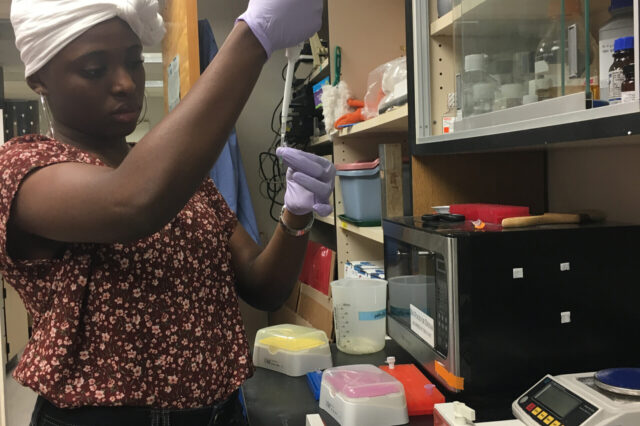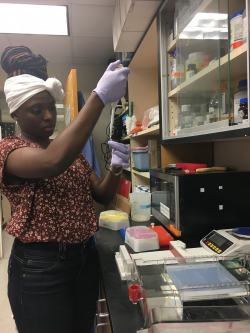UF student earns APS research fellowship

 Krystal Glasford left the small, Caribbean island of Saint Kitts when she was 20 years old. She knew she wanted to pursue a career in medicine and needed to go to the United States to do so.
Krystal Glasford left the small, Caribbean island of Saint Kitts when she was 20 years old. She knew she wanted to pursue a career in medicine and needed to go to the United States to do so.
She earned an associate’s degree in natural sciences in Saint Kitts and worked for two years to afford the move to Florida. Now a 23-year-old senior studying microbiology and cell science at the University of Florida College of Medicine, Glasford is one of only 21 students across the country chosen to be a fellow in the American Physiological Society’s 2018 Short-Term Research Education Program to Increase Diversity in Health- Related Research, or STRIDE.
The 10-week program allows undergraduate students from disadvantaged backgrounds, underrepresented racial and ethnic groups and students with disabilities to be immersed in a research laboratory. Fellows are selected based on academic merit, the quality of the proposed experience and the availability of faculty mentors, according to the APS. Each fellow receives a $4,000 stipend and research hosts receive $500 for supplies for the research projects.
Glasford chose to complete the fellowship at UF to continue working with Michelle Gumz, Ph.D., an assistant professor of medicine in the College of Medicine’s division of nephrology, hypertension and renal transplantation.
“I didn’t want to go to a different lab; this is where I really want to be,” Glasford said.
The research they are working on involves determining the role of kidneys’ circadian clock in cardiovascular health, she said.
The circadian rhythm is the 24-hour physiological pattern that our body follows each day, such as the sleep-wake cycle, and every organ has its own clock. It was already known the mice lacking the clock protein BMAL1 had lower blood pressure than control mice. To determine the role of the kidney in this effect, the lab created a novel mouse model in which BMAL1 was removed from the kidneys.
They are in the process of characterizing its phenotype in order to determine how the kidney contributes to the role of BMAL1 in regulating blood pressure.
She said this research can help physicians know what time of day to administer medicine to patients to get the best response.
“Different therapy can work for different people,” Glasford said. “All this research helps contribute to how circadian rhythm plays a role in treatment.”
Glasford, alongside the other STRIDE fellows, will present their work at the Experimental Biology meeting in April in Orlando.
Gumz said the STRIDE program is an asset to recipients because when they go into the medical field, they have knowledge and respect for basic research.
“It’s just a really great program, and I hope APS can continue it,” she said.
Gumz added that she is thrilled Glasford was able to receive the STRIDE fellowship because she is a very dedicated student. She said it is a privilege to have Glasford working in the lab alongside her.
“I knew from the get-go, she’s going places,” she said.